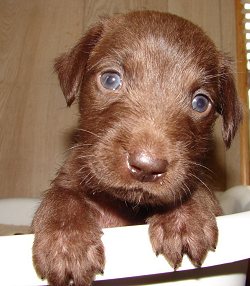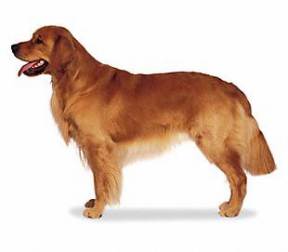Height: 21.5-24 inches
Weight: 55-75 lbs.
Life Span: 12-14 yrs.
Breed Group: Sporting Dogs
Overview
There are few breeds as gentle, affectionate, playful, eager to please,
and devoted as the golden retriever.
These sweet dogs like people and other animals and are ideal playmates for
children. They can be annoying at times because they crave so much attention
and always want to be with their owners.
Goldens generally do very well in obedience training, which should be started
early, although some dogs may be easily distracted. Gentle, positive reinforcement
is all that's needed.
Goldens may bark when a stranger comes to the door but more often as a greeting
rather than as a warning. A fenced yard is essential--goldens tend to follow
their noses and wander.
These dogs can live in the city as long as they are exercised daily and
given a lot of attention. The golden competes successfully in agility, Flyball,
tracking, and obedience; excels in narcotics detection and search and rescue;
and is regularly chosen to work as a therapy dog as well as with the physically
challenged and visually impaired.
Appearance
The outercoat is dense, shiny, wavy or flat, and water-repellent; the undercoat
is dense and waterproof.
Feathering is heavy on the front of the neck, back of the thighs, and underside
of the tail, and moderate on the back of the front legs and the underbody.
Color is various shades of rich, lustrous gold.
Grooming & Exercise Needs
Goldens shed a lot and need to be brushed and combed a few times a week.
They are happiest when they are taken on several brisk daily walks and are
given the opportunity to play with other dogs. Fetching Frisbees or balls
and swimming are favorite activities.
Origins
Developed in England and Scotland in the 19th century, the golden retriever
resulted from the breeding of a Newfoundland-derived yellow retriever with
the Tweed water spaniel and the occasional out-crossing of this new dog
with the Irish setter, bloodhound, and other water spaniels.
The advent of the breech-loading shotgun enabled hunters to down enormous
quantities of ducks, and a large-bodied dog was needed to both locate and
retrieve game. Until the golden retriever's arrival, setters and pointers
located the game, and spaniels flushed and retrieved.
Special Alerts
It is especially important to obtain a golden retriever from a reputable
breeder. Bad breeders and pet stores often sell aggressive, hyperactive,
or timid goldens with serious medical problems.
Breed-related health concerns: hip and elbow dysplasia, cataracts,
hot spots, hypothyroidism, lymphoma, subaortic stenosis.
Reference: AKC - American Kennel Club |

